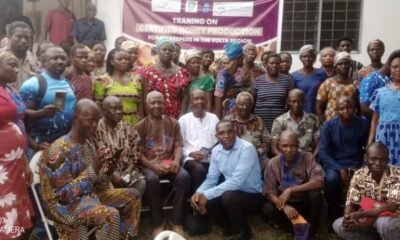Editorial
Our New Year Resolution
At the beginning of every year, some individuals and groups make resolutions to engage in new life that would bring about greater improvement than what was achieved the previous year.
This is often undertaken because individuals and groups share the view that life on this planet must see improvement rather than deterioration. Improvement occurs when we examine our mistakes and become determined to correct them in order to live a better life.
Without taking stock of past experiences and learning from our previous mistakes, we would not be able to experience improvement in life. Thus, resolutions, whether at the personal or group level, are good and must be used to guide us in what we do.
However, mere resolutions cannot help us see improvement in our lives. What is important is to keep to these resolutions and ensure that we learn from our mistakes in previous years so as to do things better in our current dispensation. This applies to everyone, whether they are children, adults, married, or unmarried. We cannot remain the same and commit the same mistakes over and over in life. We must depart from precious weaknesses and mistakes and resolve to make things better, not only for ourselves but for our family members and friends.
Let us therefore hold our resolutions in high esteem and work with them to improve ourselves.We must do well at all times to see some improvement in our present circumstances compared with the past.
There is the need to ensure national resolution so that we can make conditions better for each and every one of us. We must resolve that the Majority and the Minority in parliament collaborate to achieve what is best for the country. It is good to attain political power, but this should be done on the premise of positivism, not negetavism.
All of us are for Ghana, so the more we work together to solve all problems and improve everyone’s life, the better it will be for all citizens and even foreigners who life here.
The year 2023 must see greater achievements than we saw in 2022. Greater laurels can be achieved only when we identify our common challenges and fight together as a people to overcome them, no matter how difficult they may appear to be, so that at the end of it all, the current and future generations will benefit from the collective effort aimed at addressing our challenges.
As a people, let us resolve to attain better results in spite of our challenges, so that we can all look back after some years and share in the glory.
This is attainable, so let us work vigorously towards it.
Editorial
To all Muslims, happy Eid ul Adha!
Muslims in Ghana joined the world yesterday to observe the Eid-ul-Adha; the second of the two main festivals in Islam.
Eid-ul-Adha takes place on the 10th of Dhu al-Hijja, the twelfth and last month of the Islamic calendar, and is also referred to as the “Festival of the Sacrifice.”
It symbolises Prophet Ibrahim’s (Abraham’s) readiness to offer his son as a sacrifice in response to Allah’s instruction.
In addition to making sacrifices, the celebration aims to spread unity, love, joy, and compassion.
In Ghana, people celebrated the day with special prayers, feasts, and the customary killing of an animal and sharing the flesh with their loved ones, neighbours, and the underprivileged.
During the celebration of the festival Muslims gather at mosques or open areas for congregational prayers early in the morning. After the prayers, people visit each other, exchange gifts, and enjoy festive meals.
One aspect of the celebration is the wearing of traditional Islamic clothing, such as kaftans, jalabiyas, and abayas, which are in high demand and cause prices to rise sharply during this time.
Abayas and jalabiyas, which are frequently imported from Turkey, Dubai, Egypt, and Northern Nigeria, have become very popular clothing items, leading to price increases, according to reports from our Northern Regional Correspondent.
“Some customers complain about the cost, but many still go ahead and buy because it’s Ramadan,” a store owner said.
However, as there is no set attire for the festival, many Muslims opted for modest, loose-fitting clothing that embodies Islamic principles.
The Spectator, believes that since the celebration is a wonderful occasion and Muslims want to feel happy throughout the festivities, the traditional attire should be reasonably priced so that others can celebrate in style.
We are glad that the holy month is still a precious time despite the economic strains, and that some people make the day extra special for their loved ones.
Despite the hectic preparations the emphasis should always be on appreciating the event’s profound spiritual meaning.
Happy Eid ul Adha to all Muslims.
Editorial
Review GTC’s ban on noise-making
Dear Editor,
I write to express my concerns regarding the annual ban on noise-making instituted by the Ga Traditional Council (GTC) and its impact on Christian churches and other religious institutions.
While I acknowledge and respect the cultural significance of this period for the Ga people, it is important to highlight the challenges it poses to churches within the Greater Accra Region.
The restrictions often affect worship services, prayer meetings, and other religious activities that rely on instruments and singing as core parts of worship. In some cases, churches are compelled to suspend midweek services or modify their mode of worship entirely.
It is important that cultural and religious practices coexist peacefully in a pluralistic society. Mutual respect and dialogue should be encouraged so that neither traditional authorities nor religious institutions felt marginalised.
I respectfully suggest that the Ga Traditional Council, in collaboration with the Christian Council and other faith-based groups, consider establishing clear, fair, and mutually agreeable guidelines that allow worship to continue in a way that respects traditional observances.
Peaceful coexistence is possible when there is open dialogue, understanding, and respect for all cultures and beliefs. Let us work together toward solutions that promote unity and harmony in our communities.
Eugene Ampiaw
Accra-Mamprobi







